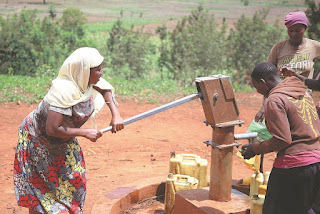Nine years since the Belt and Road Initiative was proposed, African countries have actively participated, and a number of large-scale infrastructure projects jointly built by China and Africa have begun to benefit the African continent. At the same time, under the “Belt and Road” initiative, the “Small and Beautiful” projects aided by Chinese companies are also well received by African experts. They say the projects will boost infrastructure development in remote areas of Africa that have long been neglected.
 |
| On October 14, 2021, in a village in Rwanda, villagers used a Chinese-aided well to fetch water. Image source: Xinhuanet |
In recent years, Chinese companies have invested in more "small but beautiful" projects on the African continent that directly benefit African villages.
A few days ago, China Railway Resources Group completed the construction of the eighth drinking water well in Kisamfo Village, Lualaba Province, Congo. These wells provide 3,000 people with clean drinking water. In the past, they had to walk more than 15 kilometers to get water from the river.
In addition, China Railway Resources Group will build more primary schools, health centers, sports facilities and other projects to contribute to the sustainable development of these African villages.
China Gold Chengxin Mining Management Co., Ltd. employs more than 4,500 locals in Zambia and the DRC. For the past 22 years, the company has been involved in projects to aid African villages, donating to local schools, donating anti-epidemic materials during the epidemic, and assisting in road construction.
Experts said that in order to expand public resources and fill the funding gap, African countries need to attract private financing. Unlike large projects, small projects are less risky and easier to finance and manage.
Gitasi Nguni, a Kenyan consultant, said that prioritizing small projects would accelerate the pace of Africa's industrialization.
He said: "Africa faces the dual problem of lack of capital and technology in expanding production. The concept of 'small but beautiful' solves the above problems by providing funds and necessary expertise for the development of remote areas in Africa."
Nguni said that the economies of most African countries rely mainly on agriculture and more infrastructure is needed to modernize production. "In these areas, small infrastructure projects, such as small hydropower plants, small solar power plants or small irrigation dams, can help increase the productivity of small communities and thus improve the quality of life."
In addition, the construction of infrastructure by Chinese companies in rural Africa will help local people enjoy the services that urban residents have become accustomed to.
Silas Tortorella once studied in China to obtain a master's degree in Curriculum and Pedagogy. His current research area is China-Africa cooperation.
Tortorella said that the development of roads and railways in rural Africa can facilitate the transportation of raw materials, and factories that process raw materials are mostly located in urban centers.
Improving transport networks would also unlock the economic potential of remote areas such as arid and semi-arid regions, facilitate trade and the flow of goods and people, and provide more people with electricity, communications and water, he said. (Reporter EDITH MUTEHYA Source: China Daily Network)
No comments:
Post a Comment